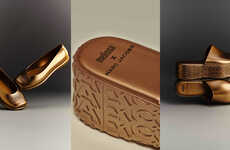
Reformation's Shoe Collection Has Eco-Friendly Flats, Heels & More
Laura McQuarrie — May 9, 2019 — Eco
References: thereformation & wellandgood
Reformation's Shoe Collection was recently launched, introducing 11 styles that are produced with the same sustainable practices as its apparel designs. The brand now offers everything from flats and espadrilles to high heels that have been mindfully made with thoughtful materials and processes.
The footwear collection favors the use of natural materials like jute—a renewable fiber with a positive carbon footprint—and chrome-free or vegetable-tanned leathers that make the most of by-products from the food industry. Reformation works with tanneries that only dye exactly what they need to create products, which ultimately helps to minimize waste. According to Reformation, its Ref Shoes save "52% CO2 emissions, 70% and 65% waste compared to most other shoes in the US."
The low-impact Ref Shoes footwear styles include standout options like the boldly hued Belle Flat and the strappy Porto Sandal.
The footwear collection favors the use of natural materials like jute—a renewable fiber with a positive carbon footprint—and chrome-free or vegetable-tanned leathers that make the most of by-products from the food industry. Reformation works with tanneries that only dye exactly what they need to create products, which ultimately helps to minimize waste. According to Reformation, its Ref Shoes save "52% CO2 emissions, 70% and 65% waste compared to most other shoes in the US."
The low-impact Ref Shoes footwear styles include standout options like the boldly hued Belle Flat and the strappy Porto Sandal.
Trend Themes
1. Sustainable Footwear - Opportunity for brands to create footwear using eco-friendly materials and manufacturing processes, reducing CO2 emissions and waste.
2. Natural Material Innovation - Potential to explore and develop new materials from renewable fibers like jute, with a positive carbon footprint, for use in footwear production.
3. Minimizing Waste in Shoe Production - Disruptive opportunity to work with tanneries that dye exactly what is needed to create products, minimizing waste and reducing environmental impact.
Industry Implications
1. Fashion - Fashion brands can adopt sustainable practices and create eco-friendly footwear collections as consumers increasingly prioritize environmental impact.
2. Footwear Manufacturing - Manufacturers can explore and utilize natural materials like jute and chrome-free leathers, reducing CO2 emissions and waste in footwear production.
3. Sustainable Fashion Retail - Opportunity for retail companies to offer low-impact footwear collections and promote brands that prioritize sustainable manufacturing practices.
2.1
Score
Popularity
Activity
Freshness























